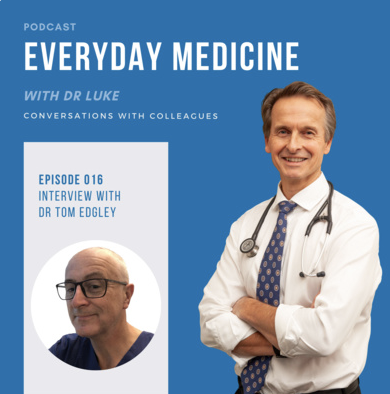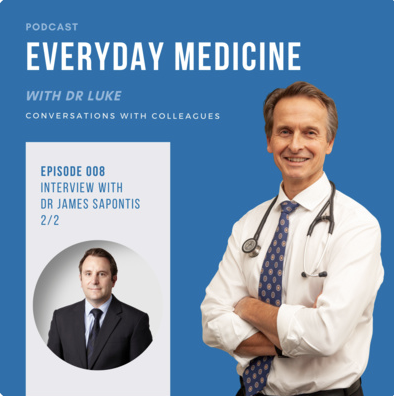Everyday Medicine by Dr Luke Crantock
Conversations with colleagues providing helpful ideas and advice in healthcare
Episode 23. Epilepsy with Dr Doug Crompton
Seizures may be defined as a transient disturbance of cerebral function due to abnormal paroxysmal neuronal discharge in the brain with epilepsy defined by any disorder characterised by recurrent (more than two) unprovoked seizures. It is estimated that 1-2% of the Australian population experience epileptic seizures in adult life and up to 4% of children experience epileptic seizures
Special Episode 1. COVID-19 Vaccinations with Professor Gabriel Barbash
Australia is in the dawn of its vaccination program against SARS-COV2, inoculations commenced this week among frontline health workers and aged care residents as well as our Prime Minister. By comparison, Israel’s vaccination rollout has been the fastest in the world, half the population has received one dose already and one third has received both inoculations.
Episode 22. Stroke with Dr Doug Crompton
It is estimated that more than 56,000 strokes will be experienced by Australians this year (new and recurrent) and that half of Australians are living with the effects of a stroke which remains the third leading cause of death in Australia and kills more women than breast cancer and more men than prostate cancer. As more than 80% of strokes may be prevented and four in 10 stroke survivors have a recurrent stroke within a decade it is very important we understand the aetiology of strokes and how we may intervene effectively to reduce incidence and morbidity.
Episode 21. IDDM with Dr Chin Tan
It is estimated that 130,000 Australians have been diagnosed with insulin dependent diabetes mellitus with about seven new cases per day. Approximately 60% of the diagnoses are in children and young adults under the age of 25 years. As IDDM is an autoimmune disease resulting in the destruction of insulin producing cells, glycaemic control is obtained through the administration of insulin. There have been several recent advances in continuous glucose monitoring and insulin delivery to review.
Episode 20. Endoanal ultrasound and anorectal physiology with Dr TC Nguyen
Endorectal ultrasonography combined with anorectal physiology allows the evaluation of the constituents of the wall of the anal canal and the scientific understanding of anorectal pathophysiology. It is very important to appreciate a patient's anorectal dynamics before initiating an effective management strategy for what may be a wide variety of pelvic-anorectal disorders.
Episode 19. Robotic Surgery with Dr TC Nguyen
Robotic assisted surgery allows doctors to perform complex procedures with more precision, flexibility and control than is possible with conventional techniques. Now used in many forms of surgery including cardiac, prostatic and orthopaedic, in this episode we are joined by the dynamic and highly skilled Mr T C Nguyen who discusses
Episode 17. CBD with Dr Sud Agarwal
Medical cannabinoids are derived from the cannabis sativa plant. There are 144 known cannabinoids, THC is perhaps the best known for its psycho-active effects, however cannabidiol (CBD) is now being recognised for its many medical applications.
Episode 16. Trauma Courses with Dr Tom Edgley
In 2019 experienced anaesthetist Dr Tom Edgley was left to defend his two properties in the rural and bushy enclave of Tonimbuk from the disastrous fires claiming over 26 properties in the region. Not only did Tom survive protecting his properties from the fire, but he also lent a major hand to his neighbours and was involved in the emotional rehabilitation of his community.
Episode 15. Type 2 Diabetes with Dr Chin Tan
In this episode we have a conversation about Type 2 diabetes, a condition that affects at least 1.2 million Australians (5% of Australians) and for which there are a complex number of pharmacologic treatment strategies available.
Episode 14. Faecal Microbiota Transplant with Dr Darcy Holt
The transfer of stool from a healthy donor into the gastrointestinal tract of a recipient (FMT) at first consideration does not seem like a reasonable or scientific approach to the treatment of gastrointestinal diseases. Historically however, it has been used by communities for over 3,000 years, gaining credibility in 1958 after a paper by Eisemen in Denver who described treating pseudomembranous colitis this way.
Episode 13. Biologics and Small Molecules in IBD with Dr Darcy Holt
DARCY HOLT - BIOLOGICS AND SMALL MOLECULES FOR INFLAMMATORY BOWEL DISEASE Biologic agents (produced in living organisms or containing components of living organisms) coupled with a variety of new small molecules (acting in novel ways to influence the human immune system) have dramatically improved medical management of inflammatory bowel disease.
Episode 12. IBD with Dr Catherine Sorrell
Inflammatory Bowel Disease (IBD) affects approximately 85,000 Australians and 5 million people worldwide and includes Crohn's disease and ulcerative colitis. These conditions may have a major impact on patient's quality of life.
Episode 11. Spinal Cord Stimulation with Dr Paul Verrils
Australia has led the world in pain management, interventional techniques and pain research including in the management of severe and debilitating axial and musculoskeletal pain via spinal cord and DRG stimulation as well as in several evolving techniques for the management of visceral pain.
Episode 10. Barrett's Oesophagus with Dr Puneet Mahindra
In this episode I have a conversation with Dr Puneet Mahindra on the subject of Barrett's oesophagus. Puneet not only discusses the origins of this condition, named after Australian born thoracic surgeon Mr Norman Barrett, but also discusses - · Its relationship to chronic reflux disease · Adenocarcinoma risk · Surveillance guidelines · Appropriate medical management Puneet makes the point that Barrett's oesophagus is an important reason why we should all take gastro-oesophageal reflux disease seriously.
Episode 9. Gastro-Oesophageal Reflux Disease with Dr Puneet Mahindra
In this episode I interview experienced gastroenterologist Dr Puneet Mahindra on the common clinical problem of gastro-oesophageal reflux disease. Puneet details - · Risk factors · Complications · Approaches to management He provides personal tips drawn from experience and the literature outlining an approach that should be helpful to everyone practicing clinical medicine.
Episode 8. Heart Failure with Dr James Sapontis
It is estimated that at least 300,000 Australians have chronic heart failure imposing a significant impact on the quality of life and mortality. In this podcast episode, we are joined by an experienced interventional cardiologist, Dr James Sapontis, as we explore heart failure with preserved ejection fraction (HFpEF) and heart failure with reduced ejection fraction (HFrEF).
Episode 7. Coronary CT Angiography (CCTA) with Dr James Sapontis
It is estimated that 1 in 4 Australian deaths relate to cardiovascular disease and that there are over 60,000 acute coronary events, including either angina or myocardial infarctions, recorded each year in Australia. In an attempt to reduce morbidity and mortality medical efforts have been directed to primary prevention and improving the selection of patients likely to require coronary intervention, such as cardiac stenting or revascularisation.
Episode 6. Bariatric Surgery with Mr Ray McHenry
In this episode we have a very interesting conversation with one of Australia's leading bariatric surgeons, Mr Raymond McHenry, on surgical approaches to weight loss, focussing particularly on the gastric sleeve and roux-en-y gastric bypass operations.
Episode 5. COVID-19 with Dr Babak Rad
Covid 19 has brought forth upon the world a pandemic unrivalled since the Spanish flu (1918 - 1920) caused by H1N1 influenza A. Described by Australian Treasurer Josh Frydenberg as the "new and invisible enemy", every doctor has had to avail themselves of knowledge regarding this highly contagious virus.




















